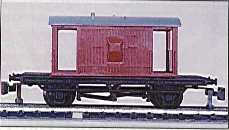No serial numbers
Virtually none of the Playcraft items had serial numbers on them making identification difficult at times.
Restaurant cars
![]() The British
restaurant car did not have a new body but was somehow made from existing mouldings, although these bodies were integral i.e. one moulding. It had one side from the composite coach and the other from the BSK. Both sides were heat - printed 'Restaurant' (except on the later blue and grey
The British
restaurant car did not have a new body but was somehow made from existing mouldings, although these bodies were integral i.e. one moulding. It had one side from the composite coach and the other from the BSK. Both sides were heat - printed 'Restaurant' (except on the later blue and grey![]() version) and the interior seating moulding was blank across the brake end side, whilst the opposite side had a counter with silver stickers representing the goods on sale.
version) and the interior seating moulding was blank across the brake end side, whilst the opposite side had a counter with silver stickers representing the goods on sale.
No running Nos.
![]() None of the blue and grey
coaches had running numbers and the restaurant car had no lettering
None of the blue and grey
coaches had running numbers and the restaurant car had no lettering
Early SNCF 2nd Class Stainless Steel Coach
There was a 'Suburban Passenger Coach' shown in the 2nd Edition catalogue, in the PR1100 clockwork set but it didn't have a catalogue number. It was a short 2nd Class version of the SNCF Stainless Steel coach but with only 6 compartments instead of 8. It wasn't shown in the 'coaches' section and by the time of the later catalogues both the set number and hence the coach, had disappeared.
This was an original Jouef model of the day, having a dark green body and grey roof, which did not find its way into the Playcraft range.
Starter Set Coaches
![]() The French standard coaches (P452/453) were re-issued
by Jouef in bright red in the early 1970's with no markings and with the early Lanal couplings. These were in clockwork starter sets which can be seen on the Jouef catalogues page.
The French standard coaches (P452/453) were re-issued
by Jouef in bright red in the early 1970's with no markings and with the early Lanal couplings. These were in clockwork starter sets which can be seen on the Jouef catalogues page.
Smaller Wheels
The wheels on the non-operational TPO were smaller than standard wheels but the overall vehicle height was the same.
Jouef SNCF 1st Class Coach
I have in my collection several SNCF stainless steel first class coaches, which have the bogies fitted completely differently from normal Playcraft practice. These have a integral boss on the top of the bogie which clips into the body, rather like the Hornby style of today. The bogies are the original pattern with the Tri-ang type couplings integrally moulded to them.
They are Jouef models from 1968/69 when they began to fix bogies in this way. The fact that the coaches have no interiors and lack the yellow '1st class' line on the cantrail also adds weight to this idea since Jouef didn't fit interiors nor correct livery for their primary series vehicles at this time. They also retained the original style of Lanal couplings so having these sort of bogies would seem to indicate that it was a pure Jouef model despite the fact that it says 'Jouef for Playcraft' underneath.
Bogie Fourgon with closed doors
![]() Another variant in my collection is a bogie Fourgon (P462) with no open doors and stick-on paper labels instead of heat printed data panels. It has Jouef couplings fixed with brass screws but also 'Jouef for Playcraft' underneath. It is understood to have been sold in France around 1964 and some even appeared in the UK with the later couplings but it never made it into the Playcraft range.
Another variant in my collection is a bogie Fourgon (P462) with no open doors and stick-on paper labels instead of heat printed data panels. It has Jouef couplings fixed with brass screws but also 'Jouef for Playcraft' underneath. It is understood to have been sold in France around 1964 and some even appeared in the UK with the later couplings but it never made it into the Playcraft range.
Picasso railcar
![]() This model (cat No: 760E) was introduced by Jouef in the 1967 catalogue. Although never featured in the Playcraft range the example I have has 'Jouef for Playcraft' underneath. This is now included on the
'Afterwards' page
This model (cat No: 760E) was introduced by Jouef in the 1967 catalogue. Although never featured in the Playcraft range the example I have has 'Jouef for Playcraft' underneath. This is now included on the
'Afterwards' page
Old Timer 4 wheel Coaches
 These came in two variants, a double decker
(P4500) and single decker (P4501) and again were not in any Playcraft catalogues. However they were available in the clear plastic Jouef containers but with later Playcraft Peco type couplers.
These came in two variants, a double decker
(P4500) and single decker (P4501) and again were not in any Playcraft catalogues. However they were available in the clear plastic Jouef containers but with later Playcraft Peco type couplers.
